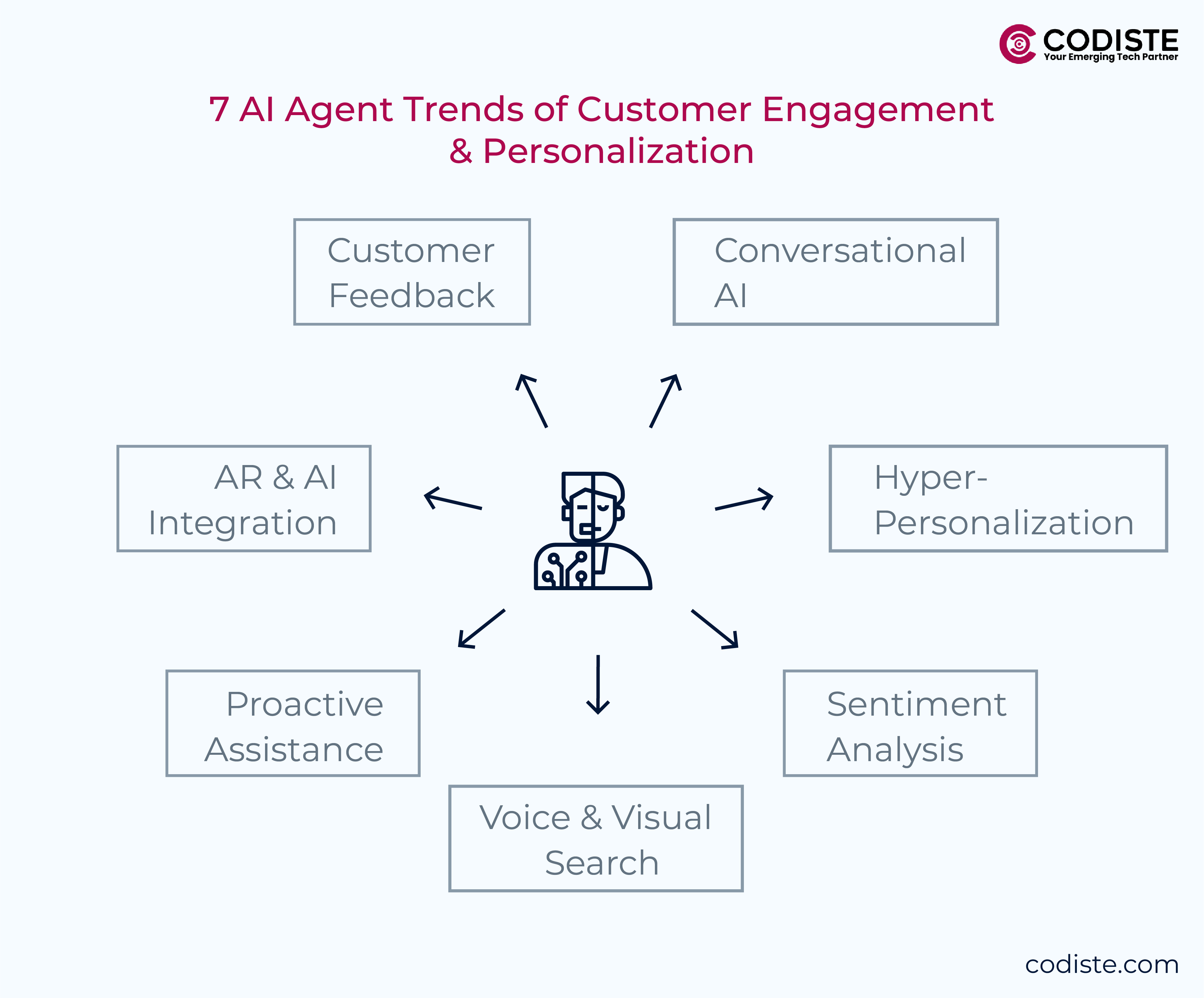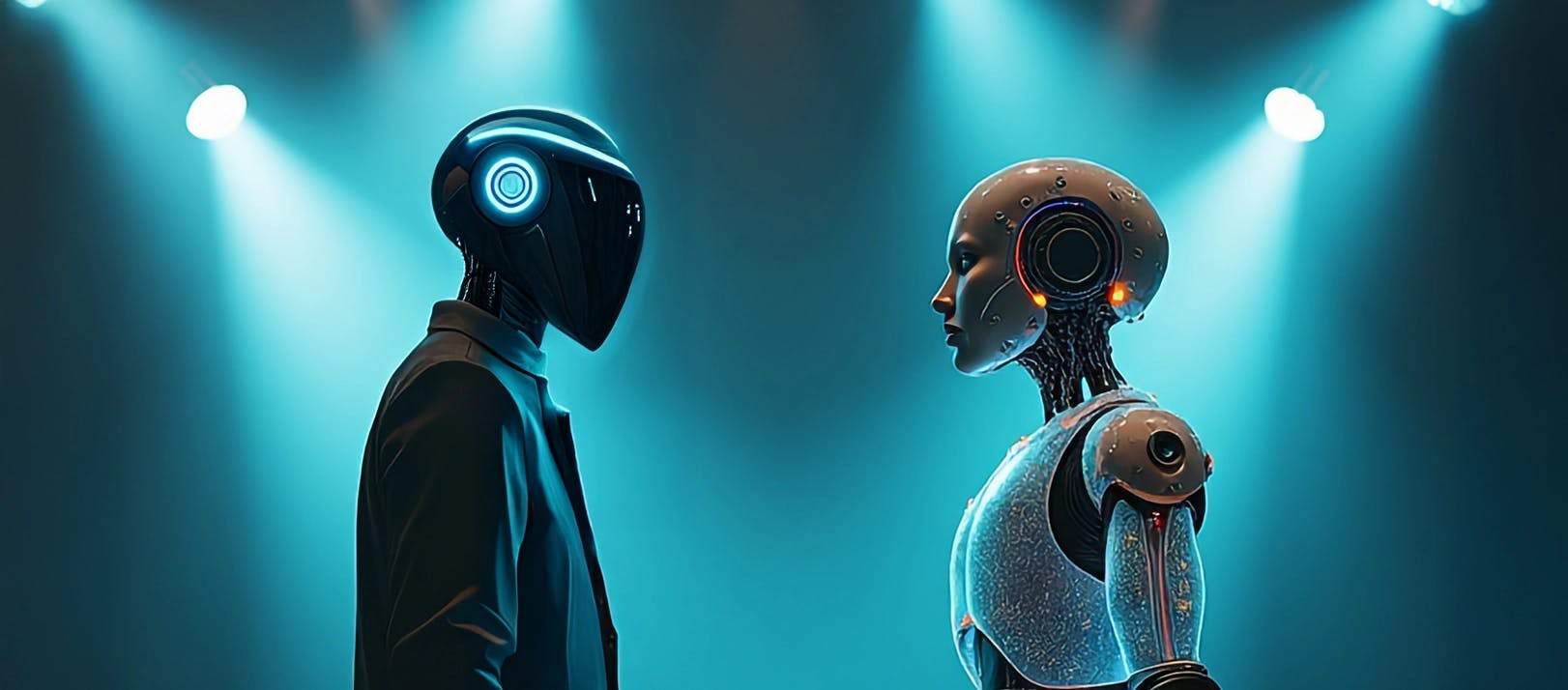
,
Think about the scenario in which you enter your favorite local café and they already know your favorite flavor even before you order it. Customized services have become a reality in the digital world. It is only possible because of AI-driven customer engagement.
Companies are moving the focus to AI agents to deliver a perfectly individualized experience. A study by Salesforce shows that 76% of customers demand businesses to have an idea of what they need and what they expect. However, AI agents for customer engagement are narrowing the gap through intelligent, data-driven interactions.
Starbucks, for instance, is a fine example. By employing AI, their mobile app recommends custom offers looking into the purchase history, the users' location, and even the weather forecast. By following this strategy they have experienced considerable growth in their revenue, and cost savings through AI customer service along with making the customers more satisfied.
AI Agents in Customer Engagement: AI-Driven Personalization
AI agents in customer engagement is the use of advanced technology to enhance Customer experience by providing the company with the customer's feedback. It not only includes chatbots and voice assistants but also includes various kinds of recommendation engines and predictive analytics which make each new touchpoint more relevant and efficient.
However, personalization is the process of customizing a client’s user experience depending on their behavior, and past interactions. Unlike a situation where every customer is treated similarly, AI guarantees that each individual gets personalized recommendations, messages, and offers.
For example, Netflix employs AI to study your viewing habits & suggest shows that may appeal to you. At the same time, Amazon’s recommendation engine suggests the products to the customers they are likely to buy.
What is AI in Customer Service?
AI in customer service refers to the integration of artificial intelligence technologies to enhance and automate support experiences. By leveraging AI-powered tools, organizations can provide quick, personalized, and seamless support, ultimately saving time and money. AI in customer service encompasses a range of technologies, including chatbots, virtual assistants, and predictive analytics, all designed to create support experiences that are fast, efficient, and tailored to individual customer needs. This intelligent technology ensures that customer queries are addressed promptly, leading to higher customer satisfaction and loyalty.
Benefits of AI in Customer Service
The benefits of AI in customer service are extensive and transformative. AI can analyze a company’s case history to identify the top reasons customers contact support, enabling proactive issue resolution. With generative AI, organizations can draft and update knowledge articles, ensuring that information is always current and accurate. AI-powered tools provide quick and exceptional support, often deflecting cases through self-service portals or chatbots, which enhances agent productivity. Additionally, AI can create work summaries and mobile work briefings, preserving and sharing knowledge across the business. By integrating customer service AI, organizations can deliver superior support experiences that drive customer satisfaction and operational efficiency.
The Role of Personalization in Customer Engagement
When people believe that a business understands them, they become more attached to that brand. AI-strengthened individuality can be understood in several means:
- Improving Customer Experience
AI can predict a customer’s wants and deliver solutions in real-time. An online store could point out items utilizing the user’s browsing activity thereby making the shopping process easier. - Building Stronger Relationships
AI-driven interactions become less robotic and more personalized. Companies using AI personification report a rise in customer loyalty. - Improving Customer Support
AI chatbots offer immediate replies, thus reducing waiting time and enhancing the overall customer service experience. - Custom Marketing Campaigns
You can send marketing messages to the right audience and AI is what makes this segmentation possible. Personalized email campaigns will surely have higher open rates and conversion rates than generic ones. - Adaptive Customer Journeys
The use of AI ensures that the customer gets content that is highly relevant to the customer at each step of the customer’s journey. For instance, a first-time visitor may get to view educational content, whereas a returning customer will instead be given product suggestions. - Real-Time Customer Engagement
Businesses use AI to exchange real-time messages and interact with their customers via chatbots, automated emails, and push notifications, which make it quick.
How Do AI Agents for Consumer Engagement & Personalization Work?
AI agents for user experience personalization function by using data collection, machine learning, and automation. This is how they make customer engagement smarter:
1. Data Collection & Analysis
AI consolidates for research and analysis data from different sources like websites, social media, past purchases, and customer support chats. From this stuff, AI can understand an individual and guess his/her emotions. By leveraging relevant customer data, AI agents can personalize interactions and create a more engaging customer experience.
2. Predictive Analytics
An AI can successfully forecast the customer’s intention to purchase items. For instance, the airline app may advise on possible flights that the passenger can take because of the travel records in the past.
3. Chatbots & Virtual Assistants
Certain AI-driven chatbots such as Sephora can suggest individual options based on user requests and previous conversations.
4. Dynamic Content & Offers
Through AI, customer preferences are guaranteed to be matched with the needed content. E-commerce enterprises use this technology to dynamically change their home pages for each user based on user interests.
5. Sentiment Analysis
AI can handle customer feedback, emails as well as social media comments to pinpoint the emotional state of users and give responses more properly. Natural language processing enables AI to understand and interpret customer feedback, providing more accurate and personalized responses. The customer then vibes with more positive experiences from the vendor.
6. Omnichannel Personalization
Based on AI, for companies that want to give a unified experience across different platforms like websites, emails, and social media, the message given to customers will always be the same.
Enhance Customer Engagement with our AI marketing solution.
Role of Human Agents in AI-Driven Customer Service
While AI is revolutionizing customer service, human agents remain indispensable for providing empathetic and personalized support. Human agents excel in handling complex customer issues that require emotional intelligence and empathy, areas where AI may fall short. By focusing on these intricate tasks, human agents can ensure that customers feel valued and understood. Moreover, human agents play a crucial role in reviewing and refining AI-generated responses using AI marketing solutions, ensuring accuracy and consistency. The collaboration between human agents and AI-powered tools allows organizations to meet evolving customer expectations and deliver exceptional customer experiences, blending the best of both worlds.
AI-Powered Analytics and Insights
AI-powered analytics and insights are pivotal in modern customer service, enabling organizations to analyze customer conversations, sentiment, and behavior. By leveraging AI, businesses can identify patterns and trends in customer data, providing valuable insights that inform strategic decisions. AI-powered analytics help measure the effectiveness of customer service strategies, pinpoint areas for improvement, and optimize support operations. This deep understanding of customer interactions allows organizations to deliver more personalized and effective support experiences, ultimately enhancing customer satisfaction and loyalty.
Customer Retention Strategies for Customer Satisfaction
Artificial intelligence or AI can detect when a person is becoming less interested and based on it offer a personalized reminder or a promotional offer. Subscription services rely on AI algorithms that have been programmed to look for signs of user disengagement. The system then triggers the required incentives to keep the users subscribed to the service.
Voice Assistants for Personalized Support
One way in which virtual assistants such as Alexa and Google Assistant aid brand promotion is by supporting hands-free, voice-based engagement. This is a simpler way for users to immediately learn all the information they need. Voice assistants can also analyze customer sentiment to provide more tailored and effective support.
Implementing AI in Customer Service Teams
Implementing AI in customer service teams requires a strategic and thoughtful approach. Organizations should begin by assessing their current customer journey to identify areas where AI can add the most value. It’s essential to consider the skills and training required for human agents to work effectively with AI-powered tools. Transparency and explainability should be prioritized in AI-powered customer service solutions, ensuring that customers understand how their data is being used and protected. By adopting AI in a responsible and customer-centric manner, organizations can unlock the full potential of AI in customer service, delivering exceptional experiences that drive loyalty and growth.
Future Trends of AI for Customer Engagement & Personalization
The growth of AI is fast, and the future of AI agents in customer engagement is becoming even more perfect:

- Conversational AI Growth
Chatbots will acquire more human-like capabilities to reach higher interactions. - Hyper-Personalization
AI will operate on real-time data to offer even more accurate suggestions. - AI-Powered Sentiment Analysis
AI will recognize emotions and create more personalized reactions to them. - Voice & Visual Search
Shoppers may discover items through voice search and visual search instead of conventional word searches. - Proactive AI Assistance
AI will find out all about the consumer in order to deliver the most accurate and suitable advice long before the customer even thinks of asking. - Augmented Reality (AR) & AI Integration
AI technologies used in AR will allow customers to virtually sample the products before they decide to purchase, thus enhancing the customer experience. - AI-Enhanced Customer Feedback
AI immediately scrutinizes feedback and recommends corrections to improve the satisfaction of the clients. - AI in Contact Centers
AI technologies will continue to transform the contact center, improving efficiency and enhancing customer interactions through hybrid approaches that combine AI and human collaboration.
Challenges & Ethical Considerations in AI-driven Customer Engagement with Natural Language Processing
AI might have great potential for businesses, but they are still required to address some critical issues:
- Data Privacy Concerns
Clients are anxious about their data privacy and how it is being used. Therefore, these companies have to obey strict rules and inform their clients about how their data is processed. - Avoiding AI Bias
There is a need to train AI models on diverse datasets if we want to be free from biased recommendations on the part of AI. - Balancing Automation & Human Touch
AI must enhance human interactions and not replace them. People like it when humans help them with serious tasks. - Ensuring AI Transparency
The companies should give customers an explanation of how AI-driven personalization is built to make it trusted by customers. - Evolving Customer Expectations
As customer expectations evolve, traditional customer service methods may fall short, highlighting the need for AI-driven solutions to provide more efficient and personalized support.
Conclusion
AI has gone from improving customer engagement to redefining it. AI makes meeting the needs of an increasingly competitive market possible because it allows for personalized interactions. Using chatbots, predictive analytics, or recommendation engines AI agents can reinforce the idea of a smooth and pleasurable customer journey.
Companies that adopt AI will have an increase in customer loyalty, growth in sales, and the rise of a stronger connection with their brand. Furthermore, companies that want to remain at the forefront and competitive within the digital world today must utilize AI-powered Real-time customer personalization as one of their strategies.
And the best way to do this is to get associated with the best AI development company, Codiste. They have deep knowledge about various tools and developments happening in the world of AI. Get in touch with Codiste to get different custom AI agents based on your needs.



The Ultimate Guide to Agentic AI and Agentic Software Development
Know more
What is Agentic AI? A Beginner's Guide to the Future of Software Development
Know more
Agentic Applications vs Traditional AI Applications: What's the Difference?
Know more
